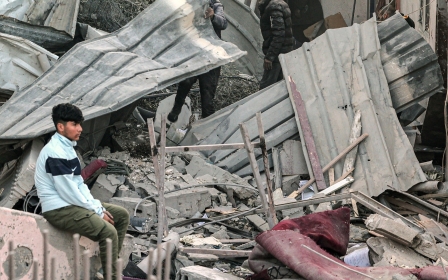Gaza ceasefire: Truce talks begin as Israel continues to bomb Rafah

Truce talks are under way to end the conflict in Gaza, even as Israel continues to bomb the besieged Palestinian territory's last refuge of Rafah.
A US envoy arrived in Israel on Thursday in the hope that negotiations to free Israeli hostages and end fighting might progress.
US State Department spokesman Matthew Miller said Washington hopes for an "agreement that secures a temporary ceasefire where we can get the hostages out and get humanitarian assistance in".
Previous discussions on reaching a ceasefire failed two weeks ago, when Israeli Prime Minister Benjamin Netanyahu rejected a Hamas proposal for a four-and-a-half-month truce that would have ended with an Israeli withdrawal.
Stay informed with MEE's newsletters
Sign up to get the latest alerts, insights and analysis, starting with Turkey Unpacked
The death toll from Israel’s war on Gaza has increased to 29,410 since 7 October, the Palestinian health ministry said in a statement on Thursday, while at least 69,465 people have been wounded.
The ministry said another 97 people were killed across the Palestinian territory in the past 24 hours.
Deadly air strikes hit Rafah on Thursday, with Gaza's Civil Defence agency reporting "a number" of people killed, while the city's al-Faruq mosque was reduced to rubble.
'If a new hostage deal is not achieved, we will continue operating also during Ramadan'
- Benny Gantz, Israeli war cabinet
Israel remains determined to push ahead with a plan to drive out more than 1.5 million displaced Palestinians from Rafah, one of the last cities in Gaza to have been spared the worst of the Israeli bombardment.
Bloomberg has reported that Israeli officials have acknowledged in private they have no precise strategy for how to do it, how long it will take, or where the people in Rafah will go.
The report quoted former national security adviser Yaakov Amidror as saying Israeli forces would move into Rafah in March, and estimating that the fighting would last until the end of April.
On Wednesday, Benny Gantz, a member of the Israeli war cabinet, indicated there were “promising early signs of progress” about a new agreement to free hostages from Gaza.
“There are ongoing attempts to promote a new hostage deal and there are promising early signs of possible progress,” Gantz said in a televised press briefing.
However, he also noted that without a new deal by 10 March, the Israeli military would continue its operations in Gaza, extending into the Muslim holy month of Ramadan, which starts in March.
“If a new hostage deal is not achieved, we will continue operating also during Ramadan,” he said.
Palestinian restrictions
On Thursday, Israel's National Security Minister Itamar Ben-Gvir called for restrictions on the freedom of movement of Palestinians after a shooting that killed an Israeli at a checkpoint near Jerusalem.
Israeli police said three Palestinian gunmen opened fire at motorists near occupied East Jerusalem, close to the Maale Adumim settlement in the occupied West Bank.
Two gunmen were killed and a third was arrested, according to police.
"The right to life of the Jewish residents of Judea and Samaria outweighs the right to freedom of movement of the residents of the Palestinian Authority," said Ben Gvir, using the biblical name for the West Bank.
"I expect there to be more and more barriers here, there will be restrictions. We need to come to an understanding that our enemies are not looking for excuses. They only want to harm. I will fight for restrictions - it's good that the prime minister accepts my principled position."
The far-right minister also promised to distribute more weapons to Israeli citizens, saying it had already prevented Thursday's shooting from being deadlier.
'Disgraceful' Gaza vote in UK parliament
There has been more fallout from a UK parliamentary ceasefire debate that descended into chaotic scenes on Wednesday.
The Scottish National Party (SNP), one of the opposition parties in the UK parliament, put forward a motion, which included condemnation of Israel for its "collective punishment" of the Palestinian people.
But the debate and potential vote on whether Britain should join international demands for a truce unravelled as procedural wrangling and a bitter split between opposition parties saw many MPs walk out in protest.
Parliamentary Speaker Lindsay Hoyle said he would break with precedent and allow a vote on Labour’s amendment before the SNP’s motion, despite contradictory advice from officials.
Labour sources told Middle East Eye that Hoyle, who visited Israel in November, was told by senior figures in the party that if he did not allow a vote on Labour’s amendment, he “wouldn’t be speaker after the general election”. The party has denied the allegations.
Amid chaotic scenes, SNP and Conservative MPs left the House of Commons in protest and the Labour amendment calling for an "immediate humanitarian ceasefire" passed without a vote.
Hoyle later apologised.
Oxfam’s head of policy and advocacy, Katy Chakrabortty, said the whole debate was a disgrace.
“It is a disgrace that there has been so much playground politics in parliament this evening, while so many lives are at stake," she said following Wednesday night’s events in parliament.
"The people of Gaza can’t wait for our politicians to stop squabbling. Much of the country lies in ruins and Rafah, where many Palestinian families have been forced to flee, is under threat of a full-scale military offensive.
"Children in the north of Gaza are dying from hunger because no aid can reach them due to Israel’s continued assault and restrictions on access."
Middle East Eye delivers independent and unrivalled coverage and analysis of the Middle East, North Africa and beyond. To learn more about republishing this content and the associated fees, please fill out this form. More about MEE can be found here.






